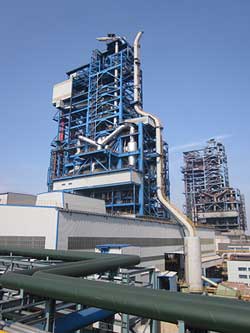Performance test proves economy efficiency of Corex hot-metal production route

Siemens Corex C-3000 plants at Baosteel, Shanghai, China<br>
After the successful performance test, on June 5, 2012, also the Final Acceptance Certificate has been signed by Baosteel. “As opposed to the conventional blast-furnace route, the Corex production costs are substantially lower,” Dieter Siuka said about the performance test. Mr. Siuka is responsible worldwide for iron production at Siemens Metals Technologies.
Less expensive and locally available raw materials yield the same quality of hot metal as higher-quality imports. Siuka expects that the Corex route will now be further rolled out as an alternative to conventional blast furnace production, especially in markets with increasing hot-metal production.
Following startup of the Corex plant in March 2011, Baosteel and Siemens have been working together over the past few months to optimize operation of the plant, which is designed for the production of 1.5 million tons of hot metal per year. “All performance parameters stipulated in the contract were achieved or exceeded,” Siuka reported. The performance test was completed in a total of 170 hours. The guaranteed production rate of 175 tons of hot metal per hour was achieved in addition to a reduction in the specific fuel rate from 950 kg to 870 kg per ton of hot metal based on local raw materials. Uniformly high quality of the hot metal was achieved in spite of the heavy fluctuation in the quality of the raw materials. “The quality of the hot metal produced in the Corex plant is comparable to that found in the product of conventional blast furnaces,” Siuka emphasized.
In light of the continuing depletion and the high cost of high-quality raw materials, and because of the environmental restrictions placed on blast furnace operation in numerous countries, the Corex-C-3000 route offers an environmentally compatible and economically efficient alternative that conserves resources. The successful performance test is a “further milestone in commercialization of the Corex production technology,” Siuka emphasized, who expects demand “particularly in markets with increasing hot-metal production levels and where raw materials are readily available.” Current plans at Baosteel call for continued operation of the Corex plant at high capacity.
The conventional blast furnace route consists of the sintering plant, coke oven plant and the blast furnace and produces hot metal from agglomerated iron ore (sinter) with the help of coke. In addition to high investment costs, the disadvantages of this route include the comparatively high emissions, for example, of sulfur oxides (SOx), nitrous oxides (NOx), dust and phenols. Liquid hot metal produced in the Corex route is melted directly from pellets and lump ore, and non-coking coal is the primary source of energy. In comparison with the conventional route, the production costs and emissions of the Corex route are lower because the coking and sintering plants (systems with the highest emissions) are not required. The Corex gas can also be used as an energy source to generate electricity or as a reducing gas in a direct-reduction plant.
Further information about solutions for steel works, rolling mills and processing lines is available at http://www.siemens.com/metals
The Siemens Industry Sector (Erlangen, Germany) is the world's leading supplier of innovative and environmentally friendly products and solutions for industrial customers. With end-to-end automation technology and industrial software, solid vertical-market expertise, and technology-based services, the Sector enhances its customers' productivity, efficiency, and flexibility. With a global workforce of more than 100,000 employees, the Industry Sector comprises the Divisions Industry Automation, Drive Technologies and Customer Services as well as the Business Unit Metals Technologies. For more information, visit http://www.siemens.com/industry
The Metals Technologies Business Unit (Linz, Austria), part of the Siemens Industry Sector, is one of the world's leading life cycle partners for the metallurgical industry. The Business Unit offers a comprehensive technology, modernization, product and service portfolio as well as integrated automation and environmental solutions covering the entire lifecycle of plants. For more information, visit http://www.siemens.com/metals
Corex is a registered trademark of Siemens AG and/or one of its subsidiaries
Reference Number: IMT201208240e
Contact
Mr. Wieland Simon
Metals Technologies
Siemens AG
Turmstr. 44
4031 Linz
Austria
Tel: +43 (732) 6592-5919
wieland.simon@siemens.com
Media Contact
More Information:
http://www.siemens.comAll latest news from the category: Process Engineering
This special field revolves around processes for modifying material properties (milling, cooling), composition (filtration, distillation) and type (oxidation, hydration).
Valuable information is available on a broad range of technologies including material separation, laser processes, measuring techniques and robot engineering in addition to testing methods and coating and materials analysis processes.
Newest articles

Properties of new materials for microchips
… can now be measured well. Reseachers of Delft University of Technology demonstrated measuring performance properties of ultrathin silicon membranes. Making ever smaller and more powerful chips requires new ultrathin…

Floating solar’s potential
… to support sustainable development by addressing climate, water, and energy goals holistically. A new study published this week in Nature Energy raises the potential for floating solar photovoltaics (FPV)…

Skyrmions move at record speeds
… a step towards the computing of the future. An international research team led by scientists from the CNRS1 has discovered that the magnetic nanobubbles2 known as skyrmions can be…





















